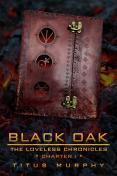
LitPick Review
Black Oak is Chapter 1 of the Loveless Chronicles by Titus Murphy. The story is set in present-day Wichita, Kansas, but has its beginnings farther back in the Great War of 1782. The Great War was waged between three sects of Witches, Hunters, and the wolf-like beasts called Jackals. The Witches and Hunters were paired up against the Jackals. They were successful in warding them off but unprepared for the power of the Riffs. The Riffs are powerful creatures that are part vampire. The story moves forward to 1815, providing more background to this ancient conflict. In present-day Wichita, the powerful spells of the Witches have held the evil Jackals back, but the strength of the barrier seems to be failing. The main character, Mark, is a noble but simple truck driver. His new relationship with Sharon is beginning to blossom, but her family and his friends both hold secrets in the past that may be needed in the present if the people of Wichita are to be kept safe.
Opinion:
Black Oak by Titus Murphy is a vivid story with great potential. I want to read the next Chapter to find out what happens to Mark and Sharon, and what these family secrets will mean for them and the city of Wichita. The darkness of the some of the characters is downright sinister. Are the good characters good enough to fend off the darkness? Mark carries some serious baggage though it may actually be part of the strategy. Sharon has fears. Her parents have strengths, however. And who are these mystery children? What powers do they have? There are many questions longing for resolution in upcoming chapters. While the plot of the story is intriguing and flows well, the dialogue between characters seems stilted in places. The dialogue is particularly stilted in the first chapters where Old English is used to match the setting. There are conjugations of pronouns that do not match with subjects and objects. The dialogue between Mark and other characters is also filled with cliches and exaggeration. The cliches and exaggerations may be on purpose, however, because the reader can expect a character like Mark to speak in that way.


